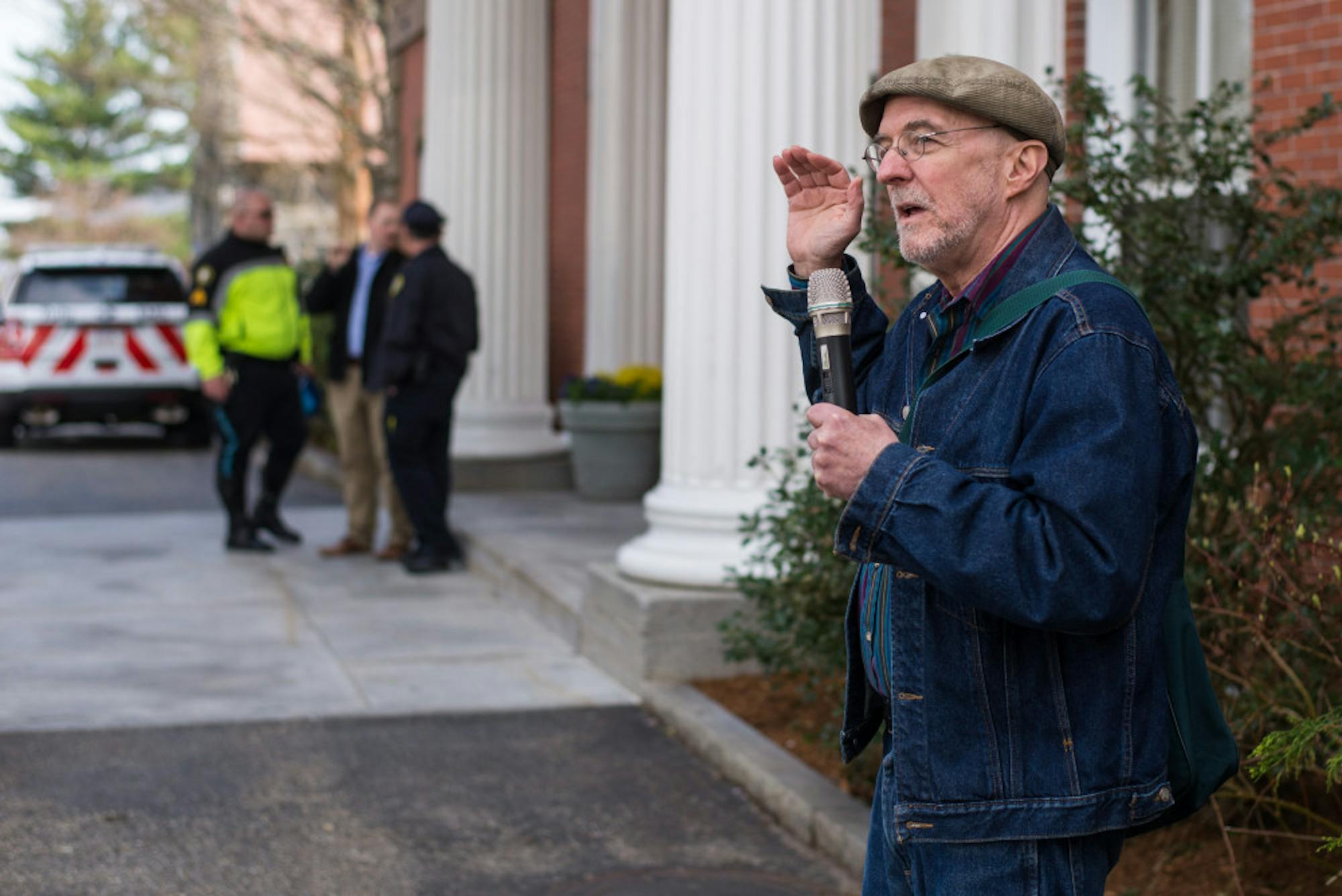Students from Tufts Labor Coalition (TLC) gathered outside the Activity Fair tent on the Academic Quad during Jumbo Days yesterday afternoon to call on the university to meet the demands of part-time faculty, who are currently in the midst of re-negotiations over their contract expiring June 30.
Part-time faculty at Tufts won their current contract in October 2014, after an organizing campaign led by the Service Employees International Union (SEIU) and TLC. The contract gave lecturers significant gains such as increased job security and pay increases. It was widely touted as an important precedent for adjuncts at other universities seeking similar improvements.
But while they went into this summer’s re-negotiations hopeful that this trend would continue, TLC activists and part-time faculty alike say that this round of negotiations has been disappointing and frustrating so far.
“We’re here because the negotiations have been very antagonistic on the part of administration,” TLC member sophomore Zoe Schoen told the Daily. “There’s been almost no engagement with [part-time lecturers].”
Andy Klatt, a part-time Spanish lecturer and a member of the bargaining committee participating in the negotiation process, addressed a crowd of activists, students and prospective student families with these concerns.
“We made a lot of gains three years ago … but we discovered that the university believes the first contract completely resolved the issue. We see it as a first step,” he said.
Klatt mentioned a few goals part-time faculty have in the re-negotiations, including improving job stability for lecturers by guaranteeing each staff member a certain number of courses per semester, expanding certain protections granted in the original contract to part-time faculty who have worked at Tufts for five years or fewer and a pay increase commensurate with cost of living.
Klatt situated the negotiations in the larger struggle for wealth equality.
“Tufts is an institution that represents the opinions of its trustees, who represent the top one percent of wealth earners in this country,” he said. “The response we’ve gotten so far from the university has been ‘No, we can’t give you these things, we need the flexibility.’ Well, to us, the flexibility of the one percent seems arbitrary.”
Schoen told the Daily that one of the main issues that needs improvement is the pay gap between part-time and full-time faculty. Part-time faculty are paid a minimum of $7,300 per course, according to the current collective bargaining agreement. By comparison, the university's 2016–2017 Fact Book lists $82,584 as the mean salary for an assistant professor in the School of Arts and Sciences.
“We want to see fair compensation for course loads," she said. "Right now, there’s a pretty ridiculous discrepancy between part- and full-time faculty to an extent where part timers are effectively subsidizing tenured faculty. We don’t want to create divisions among faculty -- everyone deserves fair pay, but these discrepancies are unbelievable.”
TLC member Nicole Joseph said that the contract re-negotiations are not only failing to improve on shortcomings in the original contract but may actually result in certain losses for part-time faculty.
“We may actually be going back a little, because we could lose some parts of the grievance process,” she said, referring to the process for adjuncts to redress complaints that was included in the original contract. “We may lose mediation, which is a key step because it includes a neutral third party.”
Schoen addressed the crowd during the rally and asked prospective students visiting for Jumbo Days to factor treatment of workers and faculty into their decision to attend one university or another.
“Our relationship with our teachers is a big part of our education, and when they don’t feel secure in their job or are struggling with money, that affects our ability to learn,” she said. “Look for a place that treats their teachers as well as they treat their students.”
Senior Daniel Weaver spoke about his participation in the organizing preceding the successful contract in 2014 and asked students take the struggles of part-time faculty seriously.
“Students don’t know just how exploitative Tufts’ policies are toward part-time faculty,” he said.
In an electronic message to the Daily, Executive Director of Public Relations Patrick Collins said, "Our part-time faculty make important and valuable contributions to our community that we value and appreciate. Because we are currently engaged in negotiations, it would be inappropriate for us to comment on proposed contract terms. We are hopeful that we will be able to find common ground and look forward to continuing our discussions.”
Throughout the rally, TLC members handed out leaflets to prospective students and their families. Joseph said that the choice to hold the rally during Jumbo Days was intentional.
“The university does a good job of presenting its services, but a big part of that is the workers and faculty, and we want [prospective students] to know how Tufts treats the people who provide those services,” she told the Daily.
Schoen agreed, adding that prospective students and their families are in a unique position to put pressure on university officials.
“It’s a very powerful position to be a prospective student, [because] you’re basically a consumer thinking about buying the university’s product,” she said.
Update: A previous version of this article contained a figure incorrectly reported in Tufts University’s 2016-2017 Fact Book. The article initially stated that the mean salary for an assistant professor in the School of Arts and Sciences is $101,496, but it is actually $82,584. The article and the Fact Book have both been updated to reflect the correct figure.






